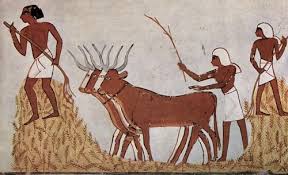The People Became Tenant Farmers on the Land
that Belonged to Pharaoh
47: 23-26
The people became tenant farmers on the land that belonged to Pharaoh DIG: When the seven years of famine was coming to an end, what was Joseph’s plan for the people sustaining themselves thereafter? Was it fair for Pharaoh? Was it fair to the people? What was their response?
REFLECT: Are you a grateful person? Are you grateful for the eighty percent the Lord gives you in your life, or do you resent the twenty percent you have to give up? In what ways has ADONAI spared your life? How can you continue to find favor in the eyes of the LORD?
Yosef said to the people of Egypt, “Now that I have bought you and your land today for Pharaoh, here is seed for you so you can plant the ground” (47:23). After the seven years of famine were over, Joseph allowed the people to return to the land. They did not return as owners, however, but as tenant farmers working the land for Pharaoh.

In the fourth stage (to see link click Kq – Joseph and the Famine), the people were taxed. But when the crop comes in at the harvest, give a fifth of it to Pharaoh. The other four-fifths you may keep as seed for the fields and as food for yourselves and your households and your children (47:24). Now that Pharaoh owned most of the land, the plan was that when the crop was reaped, the people would give twenty percent of it to Pharaoh. The other eighty percent they could keep as seed and as food for themselves. Their rent for the land, twenty percent of the produce, was lower than normal in the ancient world. This was a progressive tax in that it was proportioned according to income. In all likelihood, a similar arrangement was made for those who had occupations other than farming, like Joseph’s brothers.
The people did not complain about these terms. They said: You have saved our lives. They recognized that they were being treated fairly and generously and that there could really be no other plan which would work as well under the circumstances. They would work the same land as before and live in the same house. They would have no overhead expenses, their lives were spared, and they kept eighty percent of what they harvested. Their only desire was to continue to find favor in the eyes of Yosef. Despite the personal hardship, they were grateful for their lives and willing to be Pharaoh’s servants.737 So Joseph established it as a law concerning the land in Egypt – still in force during the time of Moses – that a fifth of the produce belongs to Pharaoh. It was only the land of the priests that did not become Pharaoh’s (47:25-26).



Leave A Comment